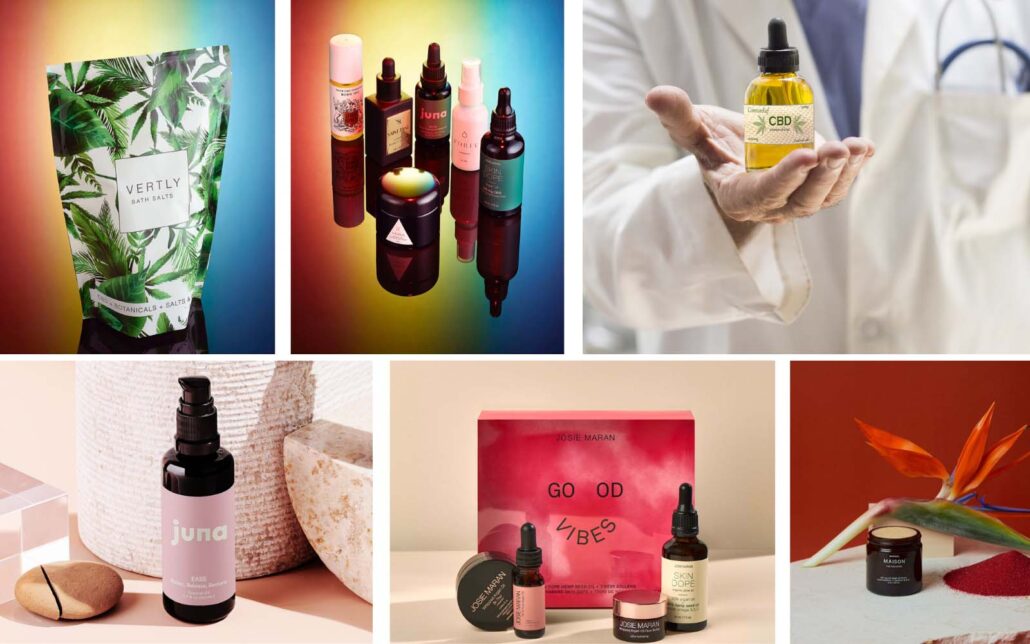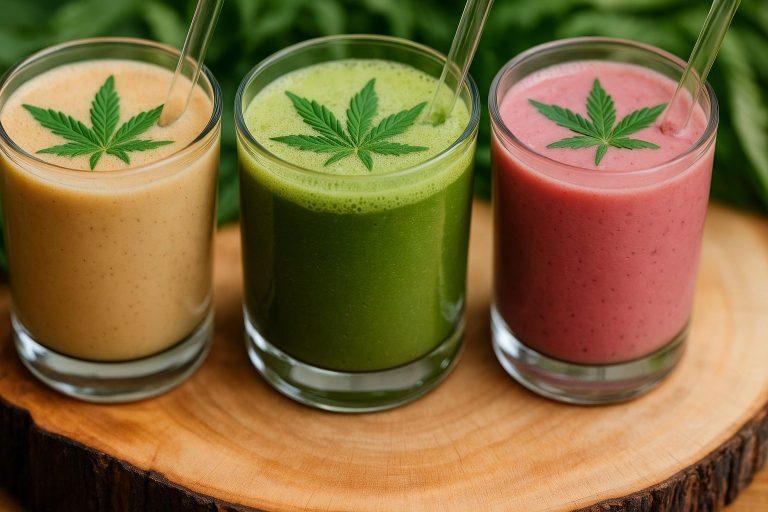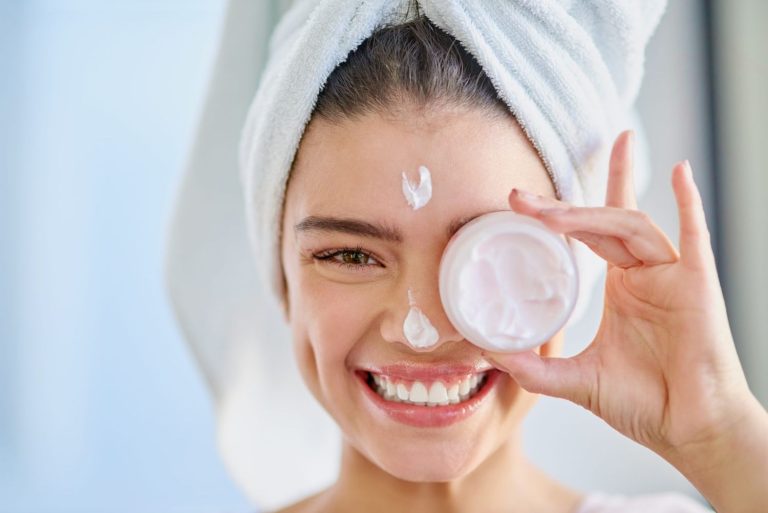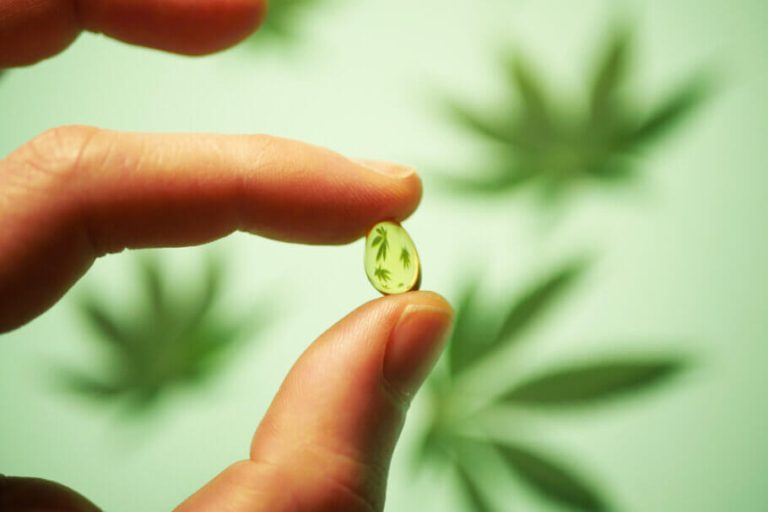With luxury CBD-infused topical creams, sprays, balms, bath salts and more being reviewed by Vogue, Surface and other popular media outlets, it’s fair to say that the skin care industry has embraced the CBD craze with open arms. But can CBD really help your skin? In this article we’ll look at what doctors and researchers are saying, the science behind how CBD works, and give readers a few pointers when purchasing CBD skin care products in Canada and other jurisdictions where they can be legally purchased.
Full Disclosure: Linked products in this article point to items for sale in our shop. We hope you’ll find these trusted product recommendations helpful!
What’s the deal: can cannabidiol (CBD) help with skin issues?
While more study needs to be done to understand exactly how CBD works, there is hard evidence that CBD reduces inflammation and pain when applied topically. At the very least, we can be certain that CBD is a great source of antioxidants and beneficial amino acids.
For consumers, it’s important to understand the distinction between CBD oil and hemp seed oil—they aren’t the same! Less scrupulous companies will market hemp seed oil as if it were the same as CBD oil. In fact, hemp seed oil only contains trace amounts of cannabidiol at best. CBD oil, on the other hand, is usually 99% pure cannabidiol blended into oil such as MCT, coconut or grape seed oil. If you’re interested in trying a CBD-infused product for your skin, make sure you read the fine print! It’s got to say CBD, and not just a few milligrams!
What do the doctors say?
Medical professionals have been open minded towards CBD, but what they really want is more research. Many doctors are seeing their patients benefit, and there’s a massive trove of anecdotal evidence that CBD works piling up. Unfortunately, doctors who would like to advise their patients to use CBD are in a tough spot. More research needs to be done before we understand enough to be able to prescribe CBD in exact amounts for particular condition as doctors would with prescription drugs. Cosmetic dermatologist Shereene Idriss, M.D., of Union Square Laser Dermatology said, “There’s a 2014 study in the Journal of Clinical Investigation that showed promising results for using CBD to treat acne.” Although she has high hopes for CBD, she can’t recommend it until she sees additional research.
But some doctors are less cautious and are happy giving advice. NYC cosmetic dermatologist Sejal Shah, M.D. said, “Generally, CBD is well tolerated by all skin types, but be sure to look for it in products that best suit your skin type.” Although CBD won’t cause irritation, other ingredient in skin care product might. “Just as you would with any new product, start ones containing CBD with caution and stop using it if develop a negative reaction,” she said.
“CBD has been shown to have a soothing effect on the skin, and has been used in the treatment of acne and rosacea as well as eczema and dryness,” said Shirley Chi, MD, a Los Angeles-based dermatologist. “The anti-inflammatory properties of CBD can help decrease itching and puffiness of skin, and even treat soreness of the skin.”
Other doctors, such as Canada’s Dani Gordon, who specialize in Cannabis medicine are much more optimistic about its potential. Her YouTube channel is highly informative with plenty of advice about how CBD works and how to use it effectively.
What does the research say so far?
Consumers use topical CBD for muscle soreness, acne, eczema, and psoriasis; some even use it to relieve sunburns. One CBD Oil Direct customer even said she’d used it to treat a bee sting. “I did it as an experiment, just to see what it would do,” she said. “It was amazing, I could actually see the bee sting swelling go down right before my very eyes.”
Though more research needs to be done, it’s not to say that there aren’t any studies out there. One conducted in 2014 by the National Center for Biotechnology Information, shows CBD may regulate the skin’s oil production, to stave off potential breakouts of irritation and sensitivity.
Thanks to powerful anti-inflammatory, lipostatic and anti-proliferative qualities, studies also indicate that CBD is good for combating acne. Dermatologist Joshua Zeichner, MD, said that the only drugs with similar abilities are oral isotretinoin (a.k.a. Accutane), hormonal treatments (birth control pills), and spironolactone. Many drugs prescribed for skin conditions can have side-effects. There’s little to no chance of that with CBD.
One way CBD reduces inflammation is by slowing the re-uptake of a neurotransmitter called adenosine. This increases the amount of adenosine in the brain. Increased adenosine levels stimulate the adenosine A2A receptor in a way that produces anti-inflammatory responses in the body. We’re beginning to get a general understanding of how CBD works, but we’ll need more research to understand all the fine details. When that happens, we’ll be able to use CBD in even more targeted and effective ways.
CBD for acne-prone skin
We now know that acne is an inflammatory condition. Although multiple factors trigger acne, we know anti-inflammatory agents can sooth our skin. That’s why CBD visibly reduces breakouts, and acne-related redness.
Research also shows that CBD has the potential to decrease excess sebum (oil) production, possibly due to its balancing effect on the flow of oil in our skin.
Despite such encouraging news, most scientists studying CBD agree that more conclusive, scientific studies are needed to confirm these initial results.
CBD and psoriasis
CBD is becoming an increasingly popular natural remedy for psoriasis. Several studies have shown the effect it has on decelerating skin cell division. CBD’s anti-inflammatory properties are thought to provide additional soothing effects to psoriasis sufferers.
What we understand about CBD’s role in psoriasis so far is that it inhibits the growth of keratinocytes—cells that renew the epithelium by producing new cells. In the case of psoriasis, the production of keratinocytes in the epithelium is accelerated, creating the scales we see develop in psoriasis cases. Cannabidiol helps normalize keratinocyte production, reducing the development of scaly skin. Recent studies indicate CBD’s potential for treating psoriasis may be very promising indeed.
CBD oil for wrinkles and anti-aging
It appears CBD oil might be a great choice for protecting and rejuvenating maturing skin.
CBD oil contains Vitamin A—a beneficial group of compounds that includes retinol, retinal, and beta-carotene, all highly acclaimed for their anti-aging properties. Vitamin A has been shown to reduce wrinkles and skin sagging, as well as protect skin against harmful UV damage.
CBD oil also contains Vitamin E, an antioxidant and the foremost nutrient in human skin. As an antioxidant, Vitamin E combats the free radicals that damage cells and accelerate aging.
By counteracting free-radical damage and reducing inflammation, CBD anti-aging creams visibly diminish issues like wrinkles, skin dullness, and redness.
CBD for atopic dermatitis
Dermatitis is associated with colder months and red, itchy rashes. Doctors treating dermatitis will almost always prescribe corticosteroid creams. These are effective in relieving symptoms, but can cause numerous unpleasant side effects. Often, when treatment with corticosteroids is complete, dermatitis returns.
Atopic dermatitis is an inflammatory disease, which is why CBD, a powerful anti-inflammatory, has a positive effect on it.
One of the reasons CBD is effective for this condition is because our skin has its own endocannabinoid system. When a CBD ointment is applied, CBD can bind itself directly to endocannabinoid receptors in the skin. The result is a quick, targeted effect on the problem area, calming the skin and restoring balance. CBD also soothes itchiness and redness, two of the more prominent symptoms of atopic dermatitis.
CBD oil for seborrheic dermatitis
 Seborrheic dermatitis is a common chronic inflammatory skin disease that usually affects the face and scalp. It presents as red, scaly skin on the scalp and near the hairline, behind the ears and in skin folds (elbows, knees, under the breasts). It’s mainly caused by increased production of sebum in the sebaceous glands. CBD can be very helpful for seborrheic dermatitis because;
Seborrheic dermatitis is a common chronic inflammatory skin disease that usually affects the face and scalp. It presents as red, scaly skin on the scalp and near the hairline, behind the ears and in skin folds (elbows, knees, under the breasts). It’s mainly caused by increased production of sebum in the sebaceous glands. CBD can be very helpful for seborrheic dermatitis because;
1. CBD slows the secretion of sebum
Excessive sebum production from the sebaceous glands is the main cause of this dermatitis. As CBD is proven to reduce sebum secretion, it can effectively diminish seborrheic dermatitis. Reducing sebum production is also why CBD is effective in treating acne.
2. CBD slows down cell proliferation on the skin
Rapid reproduction of skin cells caused by the Malassezia fungus is another causal factor in seborrheic dermatitis. Clinical studies show cannabidiol reduces sebum secretion from the sebaceous glands while also inhibiting the rapid reproduction of sebocytes, the cells that make up sebaceous glands and aggravate seborrheic dermatitis.
CBD oil for sensitive skin
Another benefit of CBD oil is that it is very soothing to the skin. Its skin-calming and skin-normalizing effects help minimize redness, sensitivity and other issues. Since all skin types are susceptible to daily environmental stressors, CBD’s soothing properties help nourish and protect skin while balancing oil production, neurotransmitter levels and skin chemistry.
How to find the best CBD skin care
The CBD skin care revolution is well underway with brands touting products that help with everything from eczema, to rosacea, to hormonal acne. With so many CBD skin care products available, it’s good to keep a little checklist in mind to make sure you’re buying quality products:
- Make sure “cannabidiol” is listed in the ingredients. As previously mentioned, hemp seed oil or extract isn’t the same as CBD oil.
- Make sure to check the total cannabidiol (CBD) content in milligrams (For example, CBD: 350mg). There’s no consensus on how much CBD you need per application so you’ll need to experiment a little to see if a stronger or weaker dose works best for you.
- Ask for 3rd party lab results. Third-party certification on the purity and stated amount of CBD is the best way to be sure you’re getting what the label claims.
- Check CBD skin care packaging. It must be stable—no jars, clear bottles or containers that exposes CBD to too much light or air. It will become less effective.
- Check for the type of CBD. Some brands advertise their CBD as being “isolate”, “full spectrum”, or “broad spectrum”. None of these terms are regulated, but they can be helpful differentiators:
- Isolate is CBD only.
- Broad spectrum is CBD plus terpenes and cannibinoids but zero THC.
- Full Spectrum is CBD plus terpenes and cannibinoids including about 0.3% THC.
6. Read packaging carefully. “Hemp Seed Oil” is not the same as CBD. Like rosehip, hemp seed oil’s main purpose is to moisturize and condition — while CBD’s is to provide anti-inflammatory relief and stimulation of the endocannabinoid system.
A plethora of products

Consumers are excited about CBD and word of mouth has spread. Brands have responded by innovating an amazing number of products that target a broad range of skin conditions. In addition, many brands augment their topical CBD products with powerful botanicals and omega-rich oils known for their brilliant restorative and rejuvenating properties. These include Vitamin E, tocopherol, sandalwood, rose, hyaluronic acid and many more. Armed with a little knowledge and understanding, consumers will find a surprisingly large selection of safe, effective products that can help improve their skin health.
References for this information:
Redox Biology, January 2020, ePublication
La Clinica Terepeutica, March-April 2019, pages e93-e99
Molecules, March 2019, ePublication
Journal of Pharmacology and Experimental Therapies, June 2018, pages 652-663
Journal of the American Academy of Dermatology, July 2017, pages 188-190
Cannabis and Cannabinoid Research, June 2017, pages 139-154
EBioMedicine, February 2017, pages 3-5
European Journal of Pain, July 2016, pages 936-948
DARU Journal of Pharmaceutical Sciences, October 2015, pages 1-17
Journal of Clinical Investigation, September 2014, pages 3,713-3,724
Free Radical Biology and Medicine, September 2011, pages 1,045-1,061
U.S. Department of Justice, Drug Enforcement Administration, e-publication
Learn more about CBD

CBD and Stress: How Cannabinoids Help You Stay Calm in a Busy World
If it feels like life keeps getting louder and faster, you’re not alone.Between deadlines, notifications, and never-ending to-do lists, most of us are
read more
CBD Smoothie Recipes You’ll Actually Love
🥤 Simple, delicious ways to enjoy your daily CBD oil. Why Add CBD Oil to Your Smoothie? Smoothies are already a great way to
read more
A Calm Routine: How to Use CBD Skincare from Morning to Night
If your skincare shelf is starting to look more like a science lab, you’re not alone. These days, there’s a serum or cream
read more
From Mouse to Marathon: Can CBD Support Endurance Through the Gut?
Gut health has become a growing focus in the wellness world, and for good reason. The gut microbiome affects digestion, immunity, and even
read more
Microdosing CBD: Why Less is More
Many assume that more CBD means better results, but that’s not always true. Instead, taking smaller doses more frequently may be a smarter
read more
Sleep Naturally: How CBD, CBG, and CBN Can Enhance Your Rest
Quality sleep is essential, yet modern lifestyles often leave us restless. With rising stress levels and digital distractions, many are turning to natural
read more

